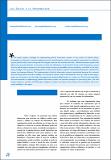|
Reseña:
|
This paper analyzes strategies for implementing judicial information systems in the context of judicial reform.Information is a key tool in decision-making processes, and information systems as powerful mechanisms for modernizingthe judicial branch and ensuring that the changes made can be sustained over time. Judicial information systems willallow more accurate decisions to be made; increase the effectiveness of the judicial service; build transparency; ensurethat the judicial system responds to the social context; increase responsibility and accountability; contribute to the legitimacyof judges; aid consensus-building efforts or help resolve disputes; improve institutional development; optimize thesystem; and improve efficiency. The implementation of judicial information systems is particularly important for countriesthat are facing serious economic problems. According the authors, judicial administration does not only increase appropriateuse of resources, but also helps the government provide judicial services at a lower cost. The document identifiesthe main obstacles to implementing judicial information systems and provides strategies for overcoming them. The final section presents a synthesis of JSCA projects designed to gather and improve the quality of the information that is currently available in the region. |

